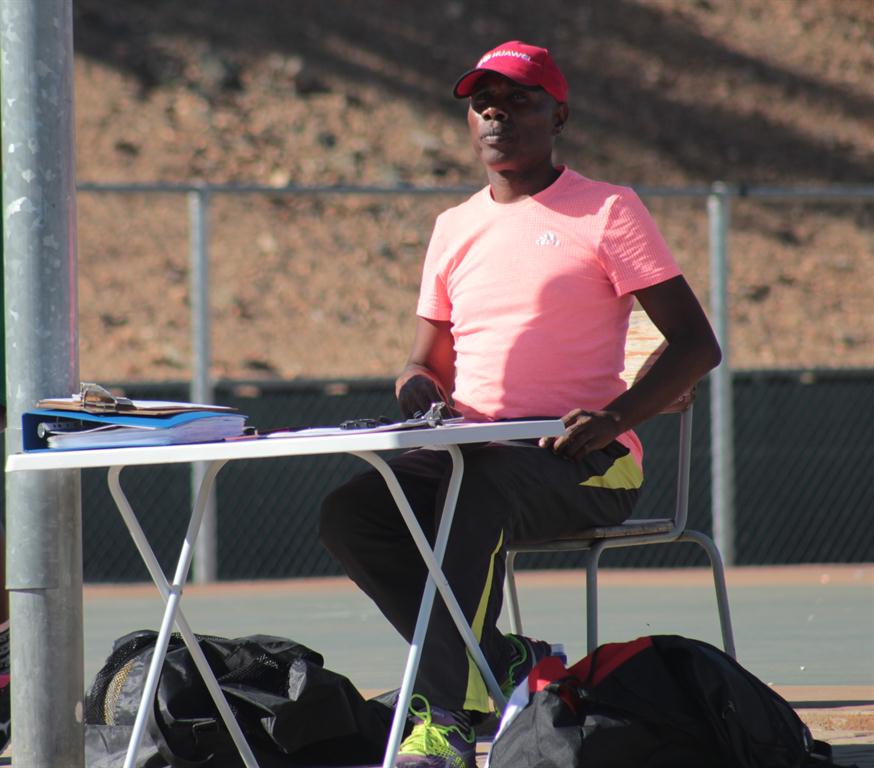Reaching new heights
Unam netball club coach, Manuel Tjivera, is changing gender stereotypes in Namibia.
The netball coach of the University of Namibia (Unam) team, Manuel Tjivera, has not only broken the ice in the female-dominated coaching domain, he is helping players to reach new heights.
The Unam Jaguars coach is one of the few male coaches who have ventured to coach in the female dominated sport code. Tjivera said it is a universal norm to have male coaches for female sports and vice versa and that there is nothing brow-rising about it.
Tjivera, who holds Level 1 and 2 coaching certificates in netball from Netball South Africa, has been nurturing netball players for the past 10 years and still finds time to do his daily job as a sales executive, and he said he manages to juggle the two very well.
His interest in netball started in high school where he challenged female players at goal shooting but even though he was good at it, he could not join the ladies team and instead decided to further his interest through volunteering to be an umpire at netball games.
With time, what seemed like just a hobby, developed into something deeper.
He began to coach local teams and received recognition for his work. While at the helm of the Unam Jaguars, the team won three consecutive Khomas Regional League titles and this resulted in the majority of his players being selected for the Under-21, as well as the Namibia senior national netball teams.
Tjivera participated in the 2016 World University Games in Florida where he rubbed shoulders with best coaches in netball at the INF High Performance Coaching Workshop in Australia.
He was also awarded Referee of the Year at the Namibia Sports Awards as well as in Mozambique in 2009 at the Region 5 Games proving that anything is possible if you set your mind to it and if one is equipped with good coaching philosophies and skills.
Such philosophies stress the importance of accountability, responsibility, team unity, discipline, mental toughness, self-confidence and the desire to compete. According to Tjivera, his team can be described as disciplined and highly motivated, saying the players put in intense effort when they are practicing and at competitions.
“The training sessions which I have designed are of high intensity, enabling athletes to work hard for a certain period and they have breaks between the drills. This is a form of cardio training. There are certain parts in netball training when players have to play with intensity for a period of time followed by a short rest. Therefore this type of training will not only help the players to get fit but it relates to a real game situation and helps them manage exhaustion in a game much easier,” Tjivera said, explaining some of his coaching techniques.
But despite the fact that intense training is needed, he said his role is to support and enhance the players’ skills by showing an interest in their abilities, respecting and listening to their needs, and helping them to realise their goals.
He also emphasised that the reason why he stays on top of his game is because he is always keeping abreast with the latest developments in netball. “I’m always reading and watching what coaches in Australia, New Zealand, England and Jamaica are up to. From there I focus on my coaching style which is player-centred,” he said.
“Coaches need to have confidence to try new things and to strive for continual improvement. University netball clubs want to empower coaches to be confident enough to make bold decisions, even if it may lead to mistakes. Sometimes, experience is what we get when we don’t get the result we want. The coach’s approach aims to create resilient and competent players who are motivated to enjoy their sport.”
Netball is inclusive and still one of the cheaper sports disciplines. However, there is a lack of netball coaches in Namibia to reach out to the biggest female sport in the country, according to Tjivera. “I hope to remain a mentor to those whose lives I’m impacting through the game and I hope many aspiring coaches join us into developing this game further,” he said.
Limba Mupetami
The Unam Jaguars coach is one of the few male coaches who have ventured to coach in the female dominated sport code. Tjivera said it is a universal norm to have male coaches for female sports and vice versa and that there is nothing brow-rising about it.
Tjivera, who holds Level 1 and 2 coaching certificates in netball from Netball South Africa, has been nurturing netball players for the past 10 years and still finds time to do his daily job as a sales executive, and he said he manages to juggle the two very well.
His interest in netball started in high school where he challenged female players at goal shooting but even though he was good at it, he could not join the ladies team and instead decided to further his interest through volunteering to be an umpire at netball games.
With time, what seemed like just a hobby, developed into something deeper.
He began to coach local teams and received recognition for his work. While at the helm of the Unam Jaguars, the team won three consecutive Khomas Regional League titles and this resulted in the majority of his players being selected for the Under-21, as well as the Namibia senior national netball teams.
Tjivera participated in the 2016 World University Games in Florida where he rubbed shoulders with best coaches in netball at the INF High Performance Coaching Workshop in Australia.
He was also awarded Referee of the Year at the Namibia Sports Awards as well as in Mozambique in 2009 at the Region 5 Games proving that anything is possible if you set your mind to it and if one is equipped with good coaching philosophies and skills.
Such philosophies stress the importance of accountability, responsibility, team unity, discipline, mental toughness, self-confidence and the desire to compete. According to Tjivera, his team can be described as disciplined and highly motivated, saying the players put in intense effort when they are practicing and at competitions.
“The training sessions which I have designed are of high intensity, enabling athletes to work hard for a certain period and they have breaks between the drills. This is a form of cardio training. There are certain parts in netball training when players have to play with intensity for a period of time followed by a short rest. Therefore this type of training will not only help the players to get fit but it relates to a real game situation and helps them manage exhaustion in a game much easier,” Tjivera said, explaining some of his coaching techniques.
But despite the fact that intense training is needed, he said his role is to support and enhance the players’ skills by showing an interest in their abilities, respecting and listening to their needs, and helping them to realise their goals.
He also emphasised that the reason why he stays on top of his game is because he is always keeping abreast with the latest developments in netball. “I’m always reading and watching what coaches in Australia, New Zealand, England and Jamaica are up to. From there I focus on my coaching style which is player-centred,” he said.
“Coaches need to have confidence to try new things and to strive for continual improvement. University netball clubs want to empower coaches to be confident enough to make bold decisions, even if it may lead to mistakes. Sometimes, experience is what we get when we don’t get the result we want. The coach’s approach aims to create resilient and competent players who are motivated to enjoy their sport.”
Netball is inclusive and still one of the cheaper sports disciplines. However, there is a lack of netball coaches in Namibia to reach out to the biggest female sport in the country, according to Tjivera. “I hope to remain a mentor to those whose lives I’m impacting through the game and I hope many aspiring coaches join us into developing this game further,” he said.
Limba Mupetami






Comments
Namibian Sun
No comments have been left on this article